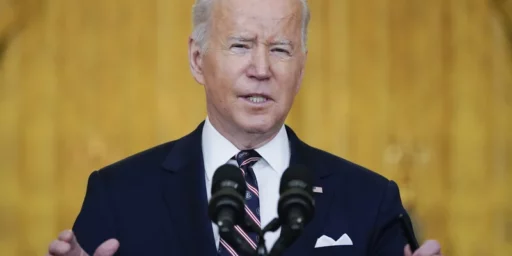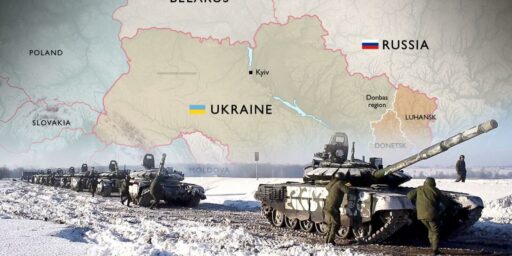Russia Imposes Sanctions Of Its Own
In response to the multiple rounds of sanctions that the West has imposed in response to Russia’s actions in Crimea and eastern Ukraine, Russia has banned the importation of a broad range of Western food and agricultural products:
MOSCOW — Russia announced on Thursday that it was banning the import of a wide range of food and agricultural products from Europe and the United States, among others, responding to Western-imposed sanctions and raising the level of confrontation between the West and Moscow over the future of Ukraine.
Dmitri A. Medvedev, the prime minister, announced that Russia would ban all beef, pork, fruit, vegetables and dairy products from the European Union, the United States, Canada, Australia and Norway for one year.
“We hoped until the very last that our foreign colleagues would realize that sanctions are a dead end and that nobody needs them,” Mr. Medvedev said. “Things have turned out in such a way that we have to implement retaliatory measures.”
Russia was still considering various measures involving aviation, including a ban on flights over Siberia, which would affect routes used by European and American airlines that fly to Asia, he told a cabinet meeting broadcast live on state-run satellite news channels.
Narrowing the air corridors open to Western carriers was another possibility, he said. Mr. Medvedev announced that all Ukrainian air carriers were barred from transiting Russian air space — effectively ending many flights to former Soviet republics from Kiev. In the Soviet era, all Western airlines were barred from flying across Russia, and barring them now would increase both costs and flying times again.
Finally, he said Russia was studying the possibility of introducing restrictions on the import of planes, navy vessels and cars, although the government would first make a realistic assessment of its own production capabilities.
(…)
Economic analysts suggested that the measures would have an immediate but moderate impact on the Russian economy, mostly as the country seeks other suppliers in Latin America and Africa for most of the food imports from Europe.
“Even if Russia says it will try to find additional sources of supply, it will be difficult in the short term,” said Ivan Tchakarov, the chief economist at Citibank for Russia. “Consumers will feel some pinch but I don’t think it will be a massive impact.”
The crisis next door in Ukraine is likely to have much more of an impact than the new food sanctions, but it could affect prices.
“The key question is what the effect on inflation will be,” he said. The bank is estimating that price increases could add one or two points to the inflation rate for 2014, currently running around 6.5 percent.
According to figures compiled by the bank and other agencies, Russia imports about 25 percent of its food, worth some $43 billion annually. Of that, about 75 percent, or $30 billion, comes mainly from Europe and the United States. The other 25 percent is mainly from former Soviet republics.
Wealthy consumers in Moscow and St. Petersburg consume goods like cheese and fruit from the West in far greater amounts than consumers in other parts of Russia. However, the cheaper dairy products and other goods that ordinary Russians buy often came from Ukraine and are now banned as well.
In other words, the sanctions that the Russians are announcing today are just as likely to hurt them as they are to hurt the West, perhaps more so. The wealthy elite won’t miss out on much, of course. They’ll find ways to smuggle in their brie and champagne and other assorted Western luxuries just as Communist Party elites managed to find a way to enjoy these things during the height of the Soviet Union. If Russia does feel any economic pain from these sanctions, then, it will be the rest of the country that feels the pain, although one has to wonder if Putin actually cares about that.
As far as the West goes, though, it’s unlikely that these sanctions are going to cause all that much economic disruption. Perhaps there will be some in Europe, but the real leverage that Putin has over the Europeans involves energy supplies, which remain untouched in no small part because they are such a large source of hard currency for the Kremlin. The other possibility, of course, is that Putin is keeping that card in reserve for a time in the future when it will be of more value to him, such as when we start heading into the cold weather months later this year.






I’m actually quite tickled pink at this. My agribusiness investment in the Maghreb has just gotten a sweet leg up on the bloody French and Spanish. Brilliant!
Hopefully this’ll result in lower grocery bills across Europe and America.